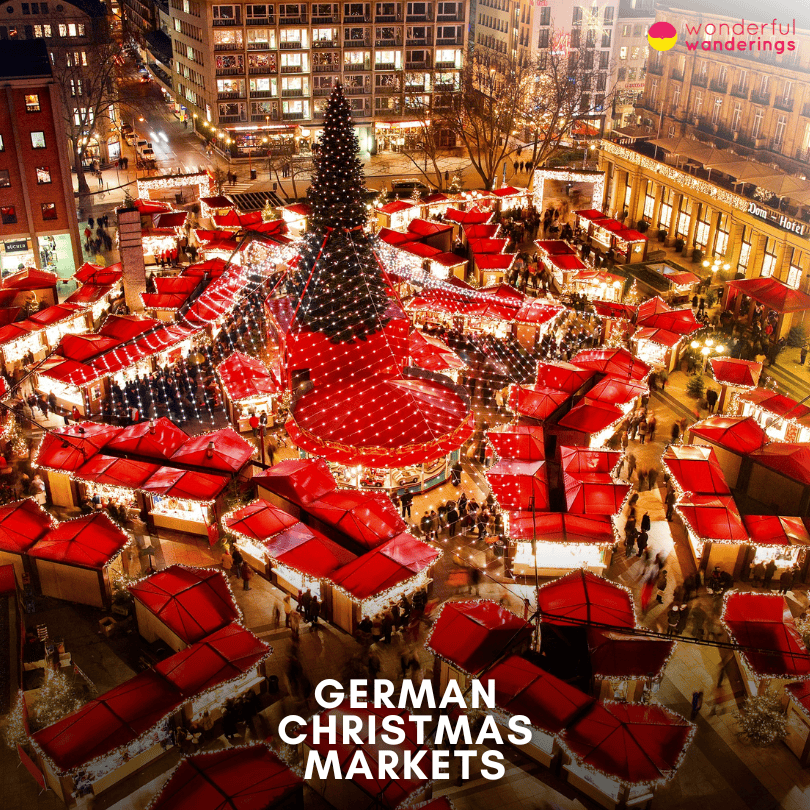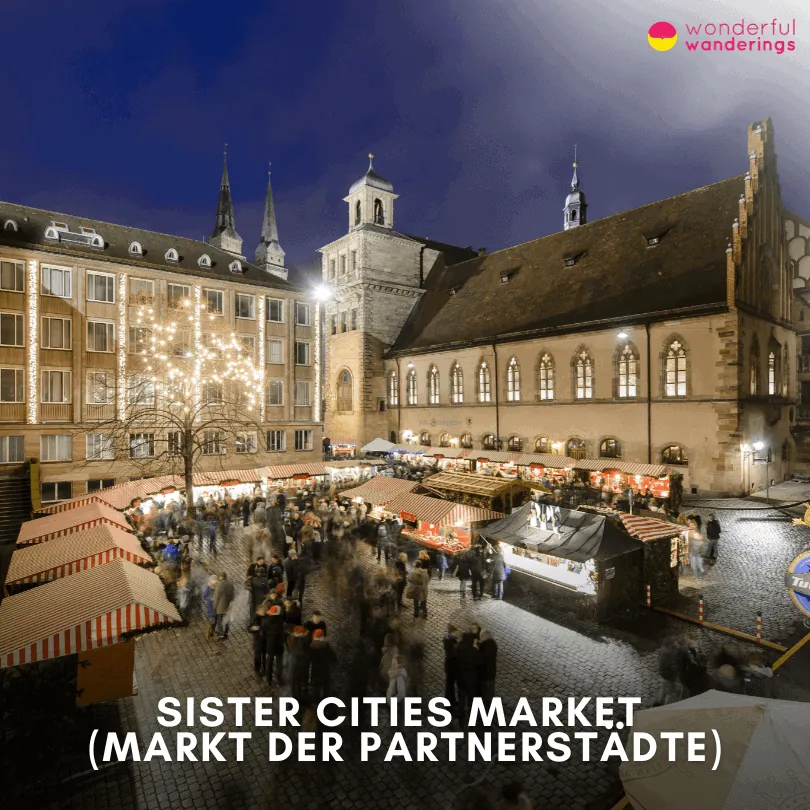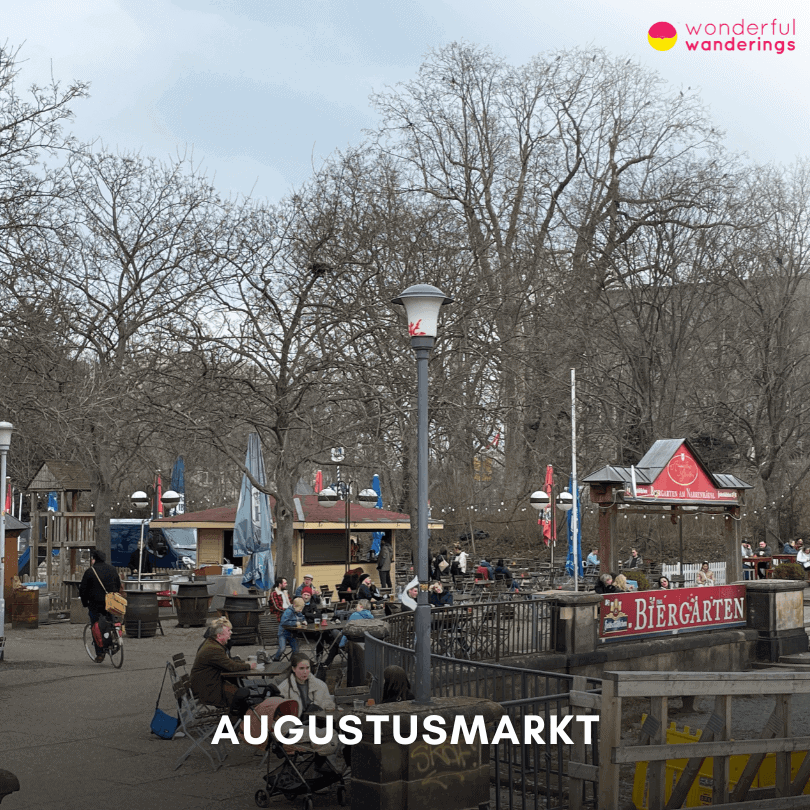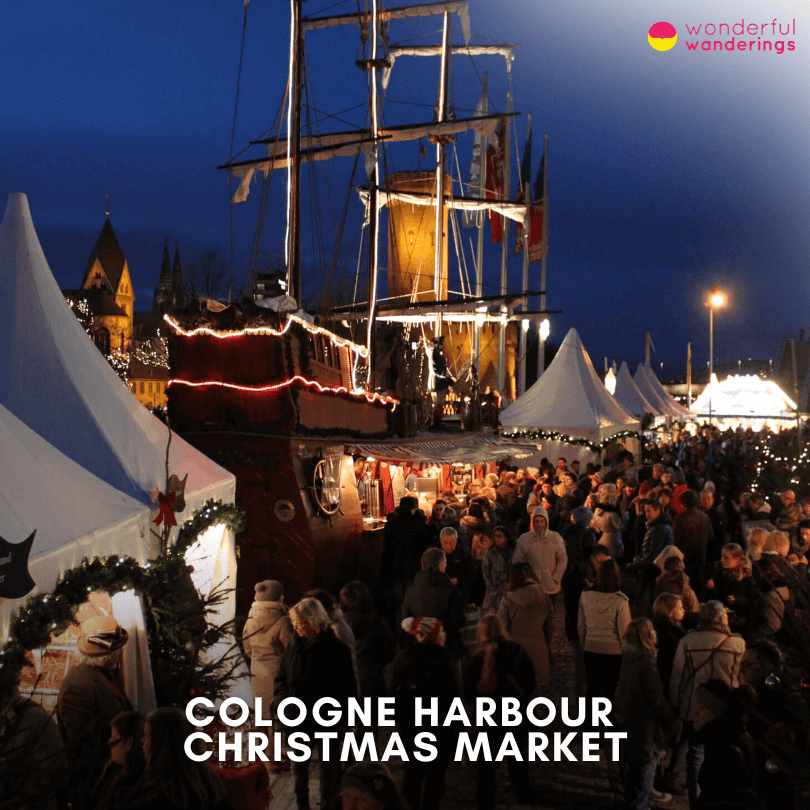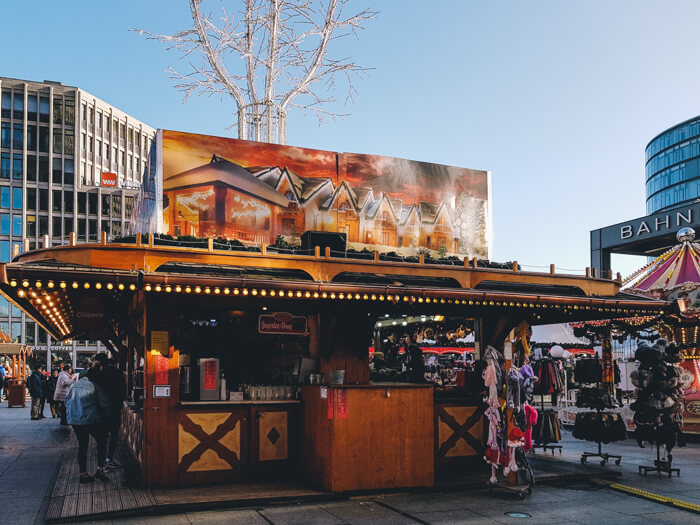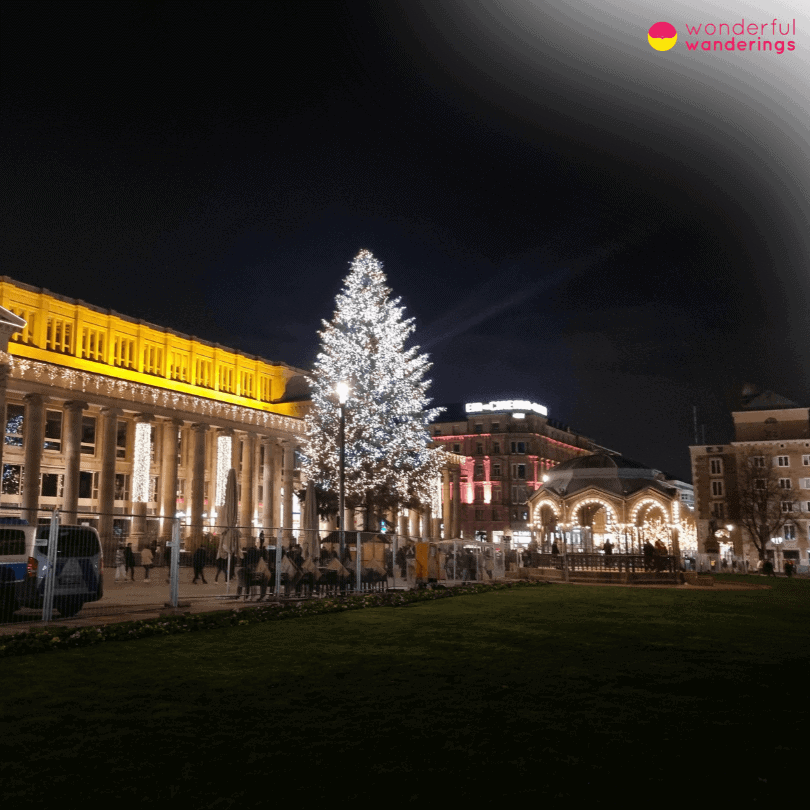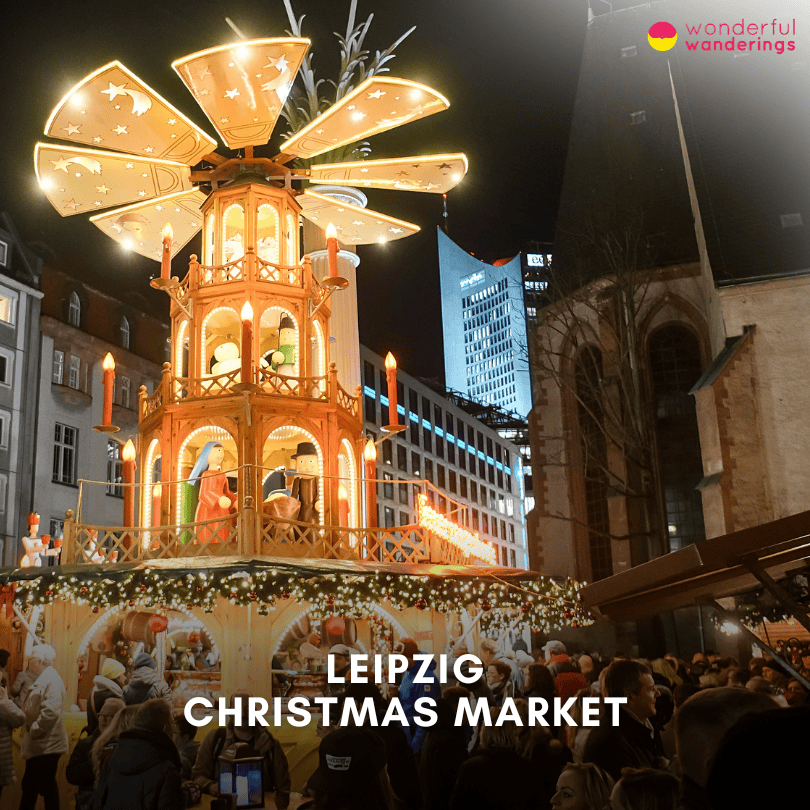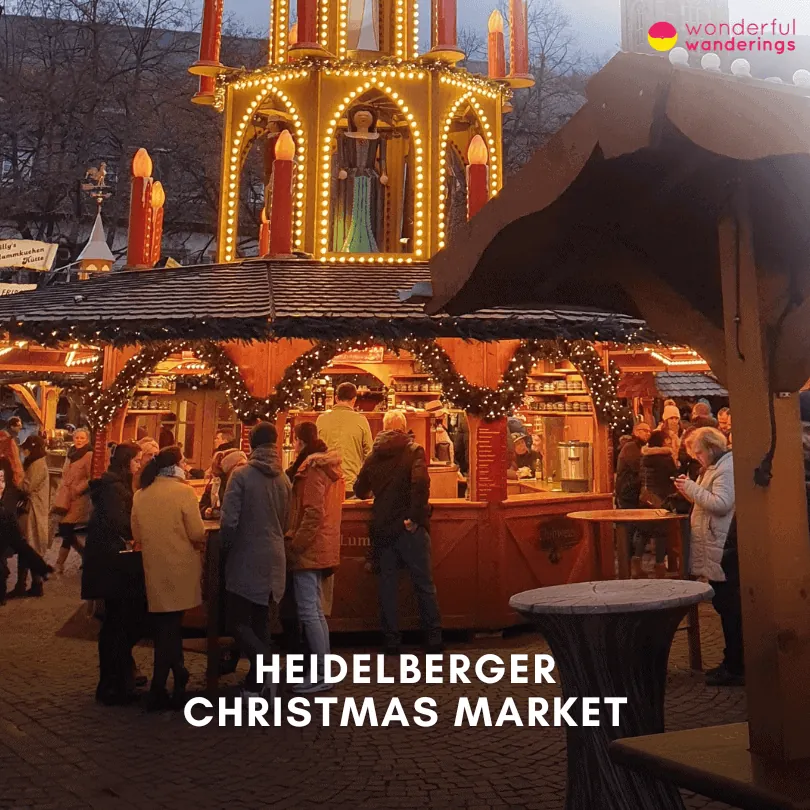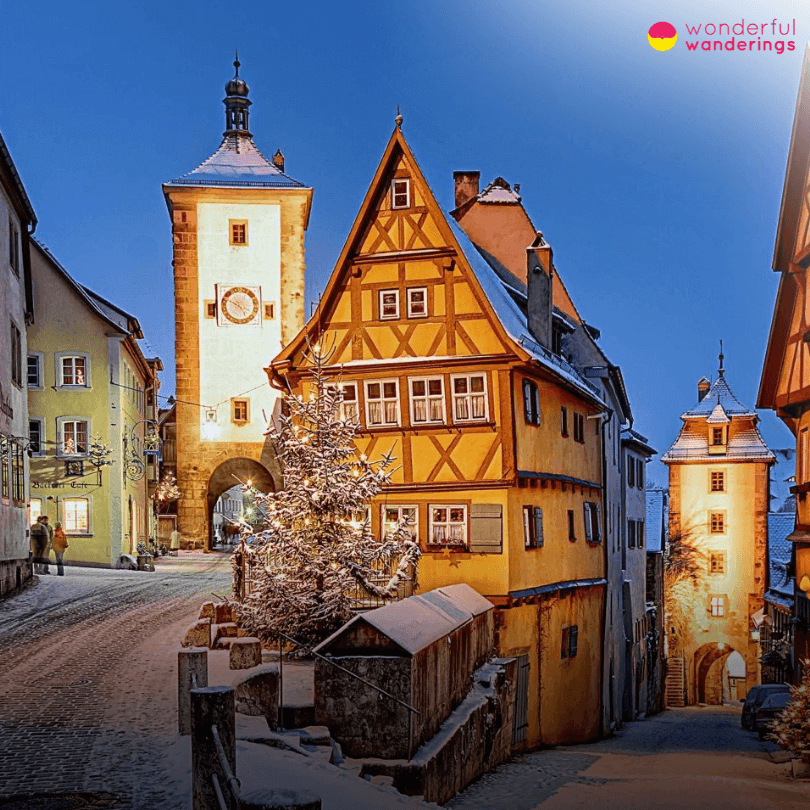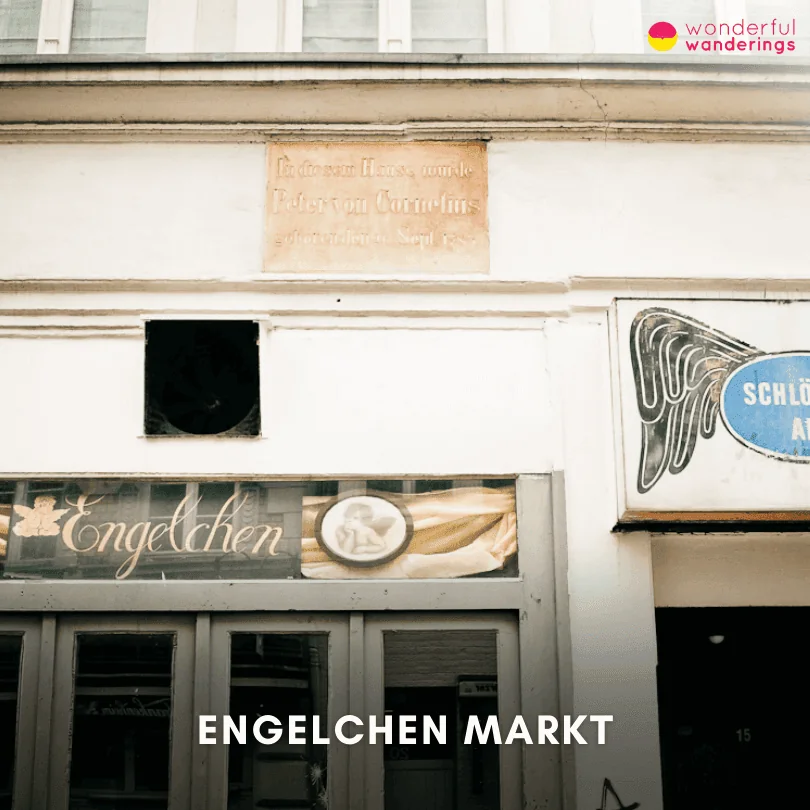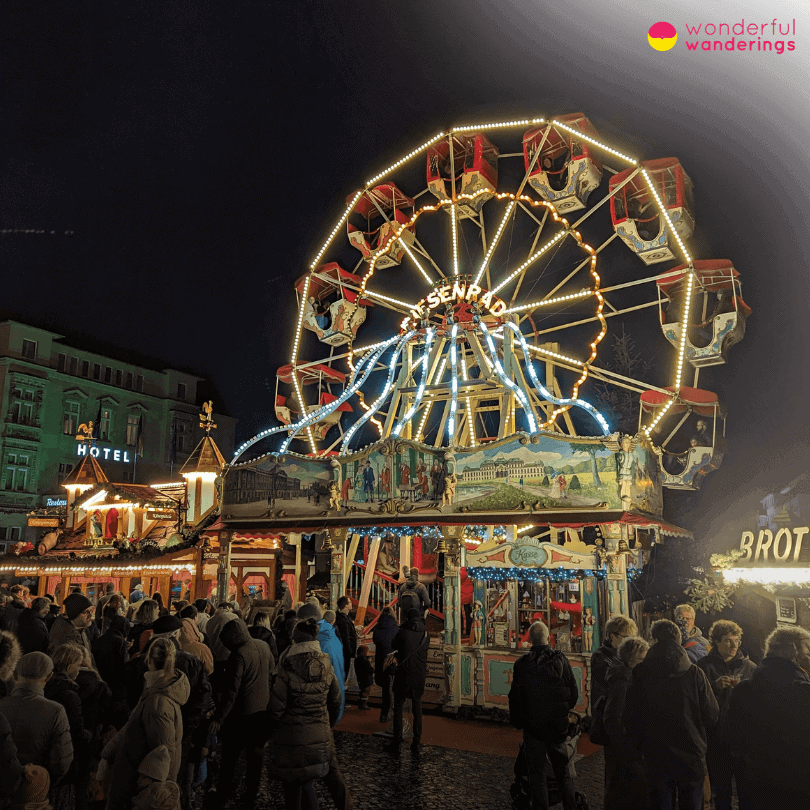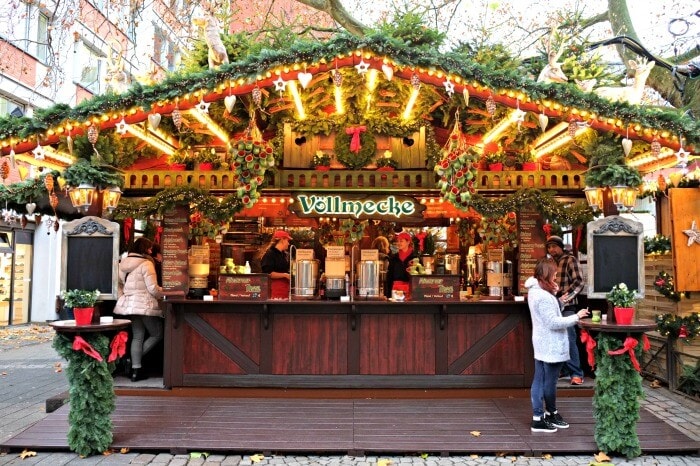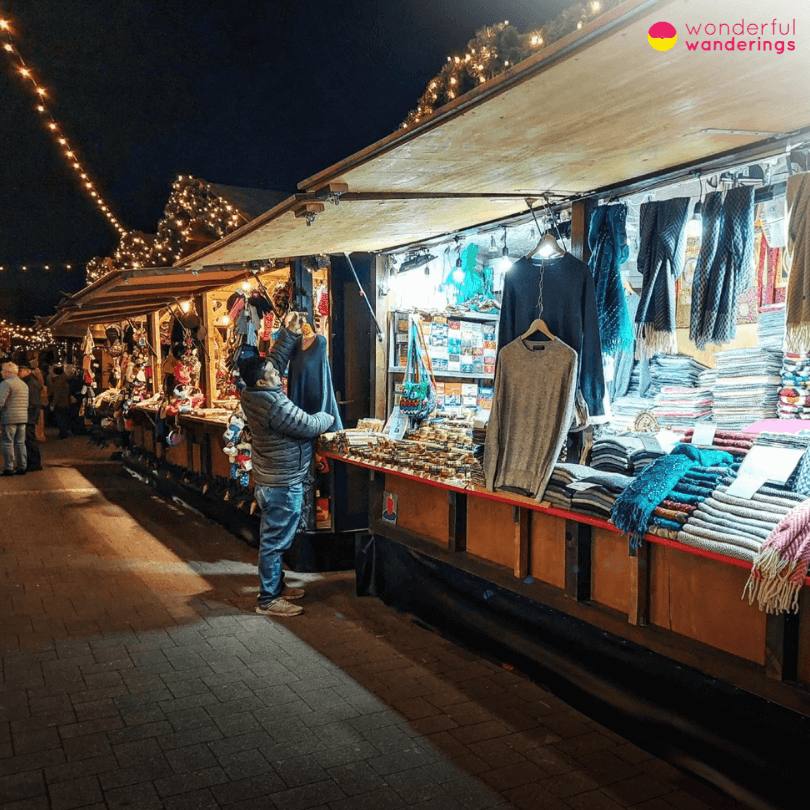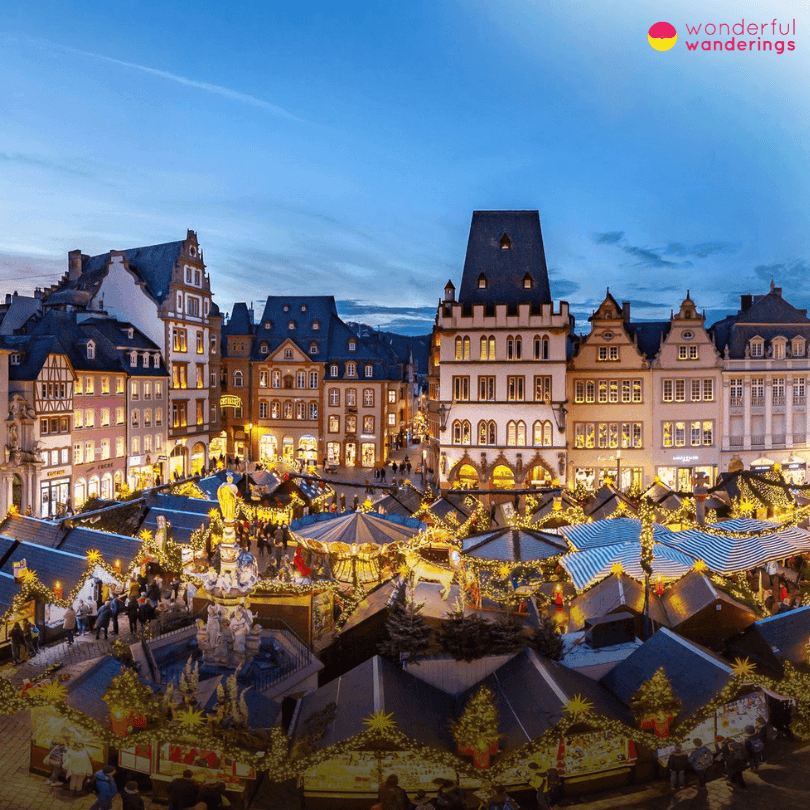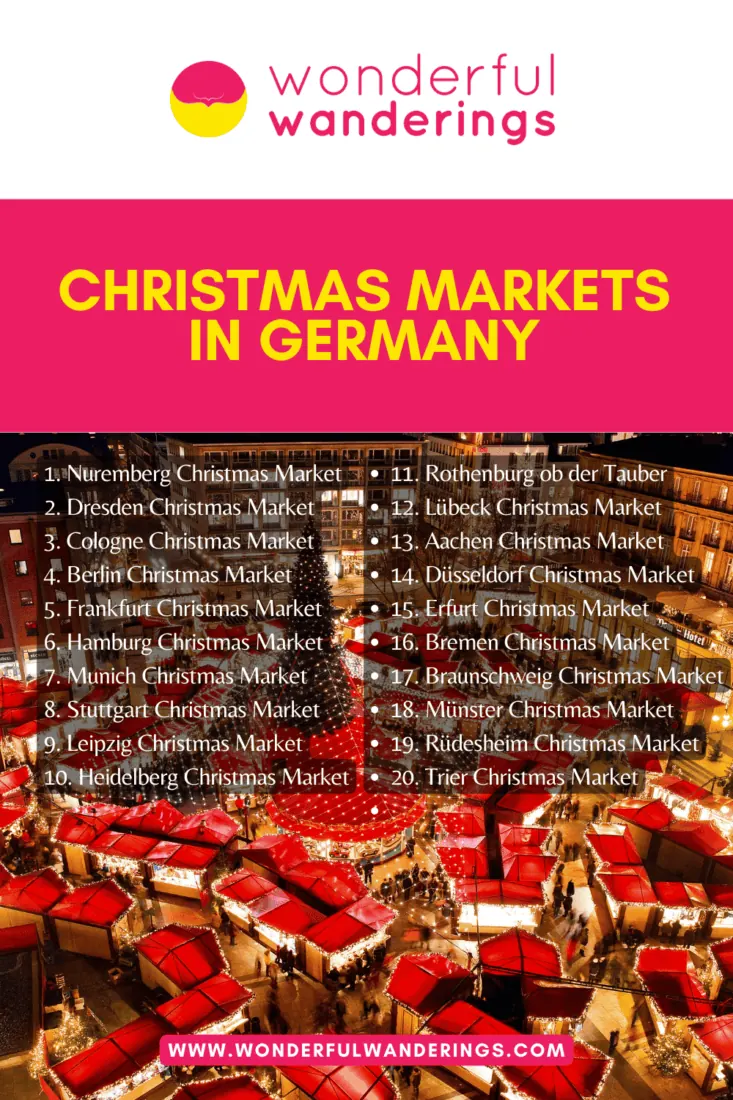Christmas Market in Germany is a traditional outdoor celebration held annually throughout the country. Some of the most well-known and iconic markets include Nuremberg Christmas Market, with over 200 stalls and sights like the Frauentorturm tower, Dresden’s 615-year-old Christmas Market, Cologne’s winter wonderland across multiple city squares and Alexanderplatz in Berlin, which hosts the city’s largest market. Other markets, such as Frankfurt, Hamburg and Munich, reflect the authentic German Christmas markets.
Contents
- 1. Nuremberg Christmas Market
- 2. Dresden Christmas Market
- 3. Cologne Christmas Market
- 4. Berlin Christmas Market
- 5. Frankfurt Christmas Market
- 6. Hamburg Christmas Market
- 7. Munich Christmas Market
- 8. Stuttgart Christmas Market
- 9. Leipzig Christmas Market
- 10. Heidelberg Christmas Market
- 11. Rothenburg ob der Tauber Christmas Market
- 12. Lübeck Christmas Market
- 13. Aachen Christmas Market
- 14. Düsseldorf Christmas Market
- 15. Erfurt Christmas Market
- 16. Bremen Christmas Market
- 17. Braunschweig Christmas Market
- 18. Münster Christmas Market
- 19. Rüdesheim Christmas Market
- 20. Trier Christmas Market
- What is the best Christmas Market in Germany?
- What is the oldest Christmas Market in Germany?
- What is the best Christmas Market in Germany to visit with kids?
- What are the best things to do in Germany during Christmas?
- What are the best foods to try in Germany during Christmas?
- Do visitors need to pay to enter the Christmas Markets in Germany?
- How do Christmas markets in Germany contribute to the local economy and tourism?
- What are the most fun facts about Germany and Christmas?
Christmas Markets in Germany highlights the historic Stuttgart and Leipzig Christmas Markets spanning over 200 stalls each, Heidelberg’s Christmas Market located at the Renaissance castle ruins, the intimate medieval location of Rothenburg ob der Tauber Christmas Market, Lübeck Christmas Market, Aachen Christmas Market, Düsseldorf’s Christmas Market and the Cathedrals Square Market in Braunschweig. The German Christmas Markets feature Rüdesheim, Bremen and Erfurt, which transports visitors through Christmas traditions worldwide with themed stalls and Trier’s Christmas Market, filled with over 100 stalls and located at Germany’s oldest Gothic Cathedral. Germany’s Christmas Markets are cherished destinations during the holiday season, allowing visitors to celebrate in a joyful and festive atmosphere.
1. Nuremberg Christmas Market
The Nuremberg Christmas Market, known as Christkindlesmarkt, is one of the oldest and largest Christmas markets in Germany. The market opens on Friday, December 1, 2023 and closes on December 24, 2023. The main market is located in the Hauptmarkt Square in the central Altstadt district of Nuremberg. The market is free to enter and open daily from 10 am to 9 pm, closing at 2 pm on December 24.
The Nuremberg Christmas Market features two notable markets. The Sister Cities Market (Markt der Partnerstädte) highlights goods and cuisine from Nuremberg’s 30+ international sister cities, including Atlanta, Leeds, Prague and Venice. It consists of over 80 stalls selling handicrafts, ornaments, toys and foods with live music acts and ice sculpting demonstrations. The Children’s Market (Kinderweihnacht) caters specifically to families and kids, with 70 stalls selling stuffed animals, books, sweets and foods ideal for children alongside entertainment like puppet shows, dances and Christmas carols. These markets attract visitors from all over the world.
The Nuremberg Christmas Market offers visitors plenty of sights, attractions and food. The main market in Hauptmarkt Square is landmarks like the Gothic Frauentorturm tower, the twin-spired 14th-century Lorenzkirche church, which hosts concerts, the iconic Frauenkirche church with its large clock and golden crown and the regal 60-foot tall Schöner Brunnen fountain decorated in lights. The markets serve finger-sized bratwursts grilled over open flames and served with sauerkraut, traditional sweets like dense honey-dough lebkuchen gingerbread and powdered sugar-dusted stollen, Reibekuchen potato pancakes with sweet toppings, crisp flammkuchen flatbread pizza fresh from the oven and warming drinks like mulled wine and rum-based feuerzangenbowle. There are non-alcoholic options like hot chocolate, warm apple cider and fruit punches. The Nuremberg Christmas Markets have something for visitors of all tastes and ages.
2. Dresden Christmas Market
The Dresden Christmas Market, known as Striezelmarkt, is one of Germany’s oldest and most famous Christmas markets. The Christmas market grew into one of Germany’s largest and most renowned, attracting over 3 million visitors annually. It takes place in the historic old town of Dresden, on the Elbe River. The market opens on Friday, November 29, 2023 and closes on Sunday, January 01, 2024. The market is free to enter and open daily from 10 am to 9 pm, with the Christmas tree and lights illuminating the square from late afternoon.
The Dresden Christmas Market features three notable markets. Augustusmarkt is the central market located across several connected squares in the heart of the city center, spanning Marienplatz, Odeonsplatz, Wittelsbacherplatz and Rindermarkt, with 200 decorated stalls. Neumarkt, known as “Advent on the Neumarkt”, occupies the historic central square next to the Baroque Old Town Hall. It hosts over 120 stalls selling holiday goods and regional specialties. Altmarkt is home to over 80 stands in the shadow of the iconic Frauenkirche church. It is located on the site of Dresden’s first Christmas market, which dates back to 1434. Vendors sell traditional Christmas decorations, ornaments, nutcrackers, smoked-glass baubles, arts and crafts, toys, textiles and a large variety of regional food and drinks. These markets attract hundreds of thousands of Christmas market visitors locally and internationally.
The Dresden Christmas Market offers visitors plenty of sights, attractions and food. Visitors can take part in hands-on craft workshops to make their own glass ornaments, candles, wreaths or nutcrackers. Children can enjoy rides on the historic carousel, the two-story Ferris wheel and the mini-train going through the market. There is an outdoor ice rink for skating surrounded by food stalls and warm drinks. The towering Christmas pyramid in Augustusmarkt is one of the highlights, with over 14,000 lights decorating the 46-foot tall wooden frame structure. Other key attractions close to the Christmas market include the Zwinger Palace and the Semper Opera House. Popular foods at Dresden Christmas Market include stollen fruitcake, gingerbread, bratwurst sausages, roasted nuts, potato pancakes and mulled wine. The Dresden Christmas Market offers traditional Christmas shopping paired with festive sights, sounds, treats and activities for visitors of all ages.
3. Cologne Christmas Market
The Cologne Christmas Market is a beloved tradition, attracting visitors from near and far to Cologne, Germany. This market is located in Altstadt on the Alter Markt. The market opens on Monday, November 20, 2023 and closes on Saturday, December 23, 2023. The market is free to enter and open daily from 11 am to 9 pm.
The Cologne Christmas Market features four notable markets. The Village of St. Nicholas Christmas Market, located at Rudolfplatz, offers lively entertainment like music and dance shows and the chance to shop for unique gifts, decorations and traditional Christmas items from various countries. The Market of Angels at Neumarkt features individually designed houses and food stands, including cuisine by star chef Maximilian Lorenz. Shoppers can find crafts and gifts amidst a festive atmosphere, with Cologne Cathedral located nearby. The Cologne Harbour Christmas Market overlooks the Rhine River next to the Chocolate Museum. Its 70 stalls in sail-shaped tents sell quality goods and foods, with highlights like a large wooden ship for mulled wine, a 157-foot Ferris wheel and maritime entertainment. Alter Markt and Heumarkt Squares celebrate the legend of helpful house elf spirits. The Christmas market features fantasy-themed decorations, an ice rink and skilled artisans. The New Year’s Market is transforming the Harbour Market into a New Year’s celebration. The market is filled with lights and music alongside treats like mulled wine, gingerbread and live shows. These markets attract visitors from all over the world.
The Cologne Christmas Market offers visitors plenty of sights, attractions and food. There are lively entertainment acts like music performances, dance shows featuring local culture, bands of pirates and shanties singers adding to the maritime atmosphere at the Harbor Market and storytellers regaling guests about folk tales and winter legends. Special events take place throughout the season, such as visits with Santa Claus, handicraft demonstrations from glassblowers or woodcarvers and even ice skating offered at Heinzels Winter Fairytale Market. Visitors to the markets can sample beloved German foods like grilled bratwurst sausages, sweet waffles, melted raclette cheese, roasted chestnuts and crispy potato fritters called reibekuchen. Warming drinks include fruit-infused glühwein, hot chocolate, Kölsch beer and spiced warm ciders. The Cologne Christmas Market creates a wonderland for Christmas Market visitors to explore.
4. Berlin Christmas Market
The Berlin Christmas Market offers a magical experience for visitors with multiple markets to explore. It is located at Bebelplatz, 10117 Berlin, Germany. The market opens on Monday, November 27, 2023 and closes on Tuesday, December 26, 2023. The market is free to enter and open on Mondays to Saturdays from 11 am to 8 pm and Sundays from 12 pm to 7 pm.
The Berlin Christmas Market features six notable markets. The Christmas Market at Alexanderplatz transforms into a festive wonderland with illuminated wooden stalls, rides, an ice rink and the largest Christmas pyramid in Europe. The Weihnachtsmarkt Nikolaikirche operates in the historic Nikolaiviertel neighborhood, which highlights Feuerzangenbowle, a German mulled wine punch drink and features special film screenings. Berliner Weihnachtszeit at Roten Rathaus between City Hall and St. Marienkirche. It features hot mead, medieval food and views from a 50-meter Ferris wheel. The Spandau Christmas Market is located in Spandau’s old town, where visitors admire the 50 years of Christmas tradition, including a magnificent illuminated tree, a historical market near St. Nikolai church and artisan wares. The Medieval Christmas Market at the RAW Compound features jugglers, acrobats and musicians to entertain guests who explore stalls selling handmade crafts and gifts. The festive Sony Center serves German treats like bratwurst and mulled wine. These markets attract hundreds of thousands of Christmas market visitors locally and internationally.
The Berlin Christmas Market offers visitors plenty of sights, attractions and food. There are fairground rides, ice skating rinks and a large Christmas pyramid at the Christmas Market at Alexanderplatz. Film screenings of the classic “Die Feuerzangenbowle” at the Weihnachtsmarkt Nikolaikirche. A 50-meter Ferris wheel provides views of the area at the Berliner Weihnachtszeit at Roten Rathaus. The Christmas market features an illuminated tree and an artisan market inside the Gothic House at the Spandau Christmas Market. Jugglers, acrobats and medieval musicians entertain guests at the Berlin Christmas Market at the RAW Compound. Holiday lights and decorations, including a large sparkling chandelier at the Sony Center and traditional wooden stalls selling gifts, ornaments, foods and more at markets across the city. Visitors can indulge in currywurst, spätzle, stollen cakes and more. Drinks range from glühwein mulled wine to hot chocolate and non-alcoholic kinderpunsch. The Berlin Christmas Markets offer an array of festive traditions for locals and must-see destinations for visitors.
5. Frankfurt Christmas Market
The Frankfurt Christmas Market is one of the largest and most popular Christmas markets in Germany. The market is held at several locations, including Römerberg, St Paul’s Square, Main Quay, Hauptwache and Friedrich Stoltze Square. The market extends from the Roßmarkt across the Zeil shopping promenade all the way down to the Römerberg and the River Main.
The market opens on Monday, November 27, 2023 and closes on Thursday, December 21, 2023. The market is free to enter and open on Mondays to Saturdays from 10 am to 9:00 pm and Sundays from 11 am to 9 pm.
The Christmas Market offers visitors plenty of sights, attractions and food. It is renowned for its massive Christmas tree, making it one of the most beautiful in the country. The market extends from the Roßmarkt across the Zeil shopping promenade all the way down to the Römerberg and the River Main. The market features a “Pink Christmas” section at Friedrich-Stoltze-Platz, which is popular with the LGBTQ+ community and welcomes visitors of all ages and walks of life. The market offers various attractions, including the chiming of Frankfurt’s church bells, an arts and craft market featuring various Frankfurt artists, a visit by Santa Claus, advent concerts, the playing of the tower horns from the balcony of St Nicholas Church, carillon at St Nicholas Church, rides on a historical steam train and carol-singing. The market offers a wide range of foods, including Kartoffelpuffer (potato pancakes), Flammkuchen, woodfired salmon, Wurst with bread and mustard, Lebkuchen and a variety of sweets and nuts. The market is a pet-friendly and accessible event, with plenty of vegetarian, vegan and gluten-free options available. The Frankfurt Christmas Market has evolved over the years to become a cherished tradition in the city, offering a unique blend of cultural and culinary experiences.
6. Hamburg Christmas Market
The Hamburg Christmas Market is a prominent event in Europe’s second-largest port city, known for its extraordinary maritime heritage. The main market is located at Rathausmarkt, where the 19th-century town hall provides a spectacular backdrop for craftsmen from around Germany. The market is free to enter and opens on Monday, November 27, 2023 and closes on Sunday, December 31, 2023.
The Christmas Market offers visitors plenty of sights, attractions and food. The market offers a setting with Christmas lights reflecting off the waters of historic canals and streets lined with beautifully decorated medieval timber-framed buildings. The market features Spielzeuggasse, where merchants from around the world sell handcrafted toys and Fleetinsel, which combines Hanseatic tradition with the city’s contemporary urban vibe. The attractions at the Hamburg Christmas Market include a variety of crafts, decorations and confectioneries, as well as a unique maritime ambiance that adds to the festive experience. The market offers traditional Christmas biscuits and a colorful variety of typical Christmas delicacies, including potato pancakes, burgers, classic meat dishes such as goose, homemade soups, fried chestnuts, tasty cakes and fluffy waffles. Special culinary highlights include the reinterpretation of typical dishes, catering to various tastes, whether savory or sweet, regional or international, meat-based or vegan.
7. Munich Christmas Market
The Munich Christmas Market, known as the Munich Christkindlmarkt, is a cherished tradition in Germany. The market is located at Marienplatz, the central square in the center of Munich. The market opens on Monday, November 27, 2023 and closes on Sunday, December 24, 2023. The market is free to enter and opens daily from 11 am to 9 pm.
The Christmas Market offers visitors plenty of sights, attractions and food. The market offers an array of attractions, including the traditional Christmas market with festively decorated stalls, the enchanting Christmas tree and the famous “Munich Christmas Angel”, who opens the market with a prologue. Visitors can also enjoy the festive atmosphere with live music, carol singing and various cultural performances. The market features the Weihnachtsdorf im Kaiserhof der Residenz, a Christmas village nestled inside the walls of Munich’s Residenz Palace, offering shopping, a large display of Christmas dolls and a variety of food relating to potatoes. Another highlight is the Munich Christmas Market, an authentic medieval market where visitors can experience a journey back in time, with food roasted over an open fire, handmade ceramic goblets for Glühwein and a commitment to sustainability and cultural heritage. The market highlights the Giant Christmas Pyramid at the Square of Stars, a tiny central market with larger-than-life decorations, creating a magical snow globe-like experience.
8. Stuttgart Christmas Market
The Stuttgart Christmas Market is one of Germany’s oldest, largest and most popular Christmas markets. It is located in the center of Stuttgart and spans several city squares and streets next to the Main Train Station. The Stuttgart Christmas Market opens on Sunday, November 29, 2023 and closes on Saturday, December 23rd, 2023. The market is free to enter and open daily from 10 am to 9 pm and its hours are extended to 10 pm on Fridays and Saturdays.
The Stuttgart Christmas Market offers visitors plenty of sights, attractions and food. The market features over 250 decorated wooden stalls selling Christmas foods, ornaments, arts, crafts, gifts and more. Visitors can also buy unique Christmas gifts and ornaments, many handmade locally by artisans, like smoked glass ornaments, carved figures and commemorative mugs. The market features special events like choir and jazz band performances, candlelit shopping nights, craft demonstrations and children’s shows. Nearby top attractions are the Wilhelma Botanical Gardens, the Evangelische Schlosskirche Cathedral featuring an 18th-century Silbermann organ and the Glanzlitcher Stuttgart Museum of Lighting History. Visitors can enjoy bratwurst sausages, potato pancakes, roasted nuts, stollen fruit cake, lebkuchen gingerbread cookies, apple cider, mulled wine and Kinderpunsch for kids.
9. Leipzig Christmas Market
The Leipzig Christmas Market is a traditional Christmas market held annually in Market Square, 04109, Leipzig, Germany. It is one of the oldest and largest Christmas markets in Germany. The market spans several city squares in the historic city center, with the main market located at Old Town Hall Square. The opens on Tuesday, November 28, 2023 and closes on Saturday, December 23, 2023. The market is free to enter and open on Sundays to Thursdays from 10 am to 9 pm and Fridays and Saturdays from 10 am to 10 pm.
The Leipzig Christmas Market offers visitors plenty of sights, attractions and food. The market features over 250 wooden cabins and stalls selling traditional Christmas wares, ornaments, crafts and food. Key attractions include the towering 26-meter Christmas tree on Augustusplatz Square, miniature railway rides, carousel rides and daily stage performances with choirs and theater groups. Visitors can try seasonal treats from Leipzig Christmas Market, like Stollen fruit bread, gingerbread hearts, Thuringian bratwursts, potato pancakes with applesauce toppings and Grobrot bread rolls. Warm drinks include mulled wine, gingerbread liqueur, rich hot chocolate and fruit wines made with strawberries or raspberries. Leipzig’s Christmas Market is considered a must-see bucket list destination for the holiday season.
10. Heidelberg Christmas Market
The Heidelberg Christmas Market is an annual traditional Christmas market held at Alsradt in the city of Heidelberg, Germany. The market opens on Monday, November 27, 2023 and closes on Friday, December 22, 2023. The market is free to enter and open on Sundays to Fridays from 11 am to 9 pm and on Saturdays from 11 am to 10 pm.
The Heidelberg Christmas Market features two notable markets. Marktplatz hosts the largest Christmas market in Heidelberg, with over 140 wooden huts, vendors, food stalls, an ice skating rink, carousel rides and a stage for performances. Kornmarkt takes place at the Kornmarkt square along the Neckar River’s banks. The market features 40 vendors set up traditional market stalls at the Kornmarkt, surrounded by historic sites like the Church of the Holy Spirit and Heidelberg’s old Town Hall. These markets attract over 1.5 million visitors each Christmas to enjoy the festive sights, sounds, smells and tastes of these traditional German Weihnachtsmärkte.
The Christmas Market offers visitors plenty of sights, attractions and food. Attractions at the Heidelberg Christmas Market include an ice skating rink installed in the Marktplatz, a vintage carousel, live music performances on an open-air stage and workshops where visitors can craft traditional wreaths or decorations. The market hosts special events, including choral concerts, dance performances, small theatrical productions and appearances by St. Nicholas. Food and drinks available at the Heidelberg Christmas Market stalls include bratwurst sausages, potato pancakes, flamekuche (German-style flatbread pizza), roasted almonds, traditional gingerbread called lebkuchen, roasted chestnuts, stollen fruitcake and cups of hot mulled wine called gluhwein. The Heidelberg Christmas Market brings the of old-world Germany alive each holiday season.
11. Rothenburg ob der Tauber Christmas Market
The Rothenburg ob der Tauber Christmas Market is an annual traditional Christmas market held in the medieval walled town of Rothenburg in Bavaria, Germany. The market is free to enter and opens on Friday, December 01, 2023 and closes on Saturday, December 23, 2023. The market hours are from 11 am to 7 pm. The market on Fridays and Saturdays stays open until 8 pm.
The Rothenburg ob der Tauber Christmas Market offers visitors plenty of sights, attractions and food. The market features over 100 wooden stalls selling traditional German Christmas wares, decorations, ornaments and food. Visitors will find the market stalls spanning Ratstrasse Street, which leads up to the central Market Square (Marktplatz). Attractions at the Rothenburg Christmas Market include an exhibition of antique nutcrackers displayed at the Christmas Museum, Christmas concerts performed daily, a romantic, historic Nativity walk called the “Rothenburg Christmas Trail,” and the Rothenburg Reiterlesmarkt medieval horse market held on December 2nd. The market highlights attractions such as the glockenspiel clock tower chiming from St. George’s Church and views of the towered city gate entrances that are lit up at night. Food and drinks available at the Rothenburg ob der Tauber Christmas Market consist of bratwurst, potato pancakes, fried dough twists, roasted almonds, traditional gingerbread called lebkuchen, roasted chestnuts, stollen fruitcake and cups of hot mulled wine called gluhwein. Special regional dishes like smoked ham hocks and Franconian carp are featured. The Rothenburg ob der Tauber Christmas Market provides a medieval winter wonderland for visitors each year.
12. Lübeck Christmas Market
The Lübeck Christmas Market is an annual highlight in the Hanseatic city of Lübeck. The Christmas market opens on Monday, November 27, 2023 and closes on Saturday, December 30, 2023. The market is free to enter and open from Fridays to Saturdays from 11 am to 10 pm and Sundays to Sundays from 11 am to 9 pm.
The Christmas Market offers visitors plenty of sights, attractions and food. This festive tradition has a long history dating back to 1648. Lübeck, renowned for its medieval architecture and status as a UNESCO World Heritage Site, provides the perfect backdrop for this Christmas market. The buildings surrounding the marketplace give it a distinctive ambiance. The market stalls spread throughout the city center, inviting visitors to stroll and linger. The market has culinary highlights, including roasted almonds, Mutzen (a traditional pastry) and mulled wine. The combination of historical ambiance, diverse offerings and the warm hospitality of Lübeck’s people makes this Christmas market an unforgettable experience. The Lübeck Christmas Market embodies the true spirit of the holiday season.
13. Aachen Christmas Market
The Aachen Christmas Market, known as the Aachener Weihnachtsmarkt, is a cherished tradition in the historic city of Aachen, Germany. The Christmas market opens on Friday, November 24, 2023 and closes on Saturday, December 23, 2023. The market is free to enter and open daily from 11 am to 9 pm.
The Christmas Market offers visitors plenty of sights, attractions and food. The Aachen Christmas Market is renowned for its unique attractions, including the traditional stalls located at the Aachen Cathedral and the Town Hall. Visitors can enjoy the festive ambiance, explore the beautifully decorated wooden huts and discover a wide range of handcrafted gifts, decorations and seasonal goods. The market features a diverse program of entertainment, including live music, cultural performances and special events for families and children. The Aachen Christmas Market offers a variety of culinary delights, including traditional German Christmas treats such as Stollen (fruit bread), Lebkuchen (gingerbread), roasted chestnuts and a selection of hearty and sweet snacks. Visitors can indulge in warm mulled wine, hot chocolate and other festive beverages to keep warm during their visit. The market’s unique setting, rich history and vibrant atmosphere make it a must-visit destination for locals and tourists alike during the holiday season.
14. Düsseldorf Christmas Market
The Düsseldorf Christmas Market is one of the oldest and largest Christmas markets in Germany, with origins dating back to the 16th century. The market takes place in Altstadt of Düsseldorf, Germany. The market opens on Thursday, November 23, 2023 and closes on Saturday, December 30, 2023. The market is free to enter and opens Sundays to Thursdays from 11 am to 8 pm and Fridays and Saturdays from 11 am to 9 pm.
The Düsseldorf Christmas Market features seven notable markets. The Engelchen Markt in the Heinrich-Heine-Platz square features over 240 booths packed with traditional decorations, ornaments, toys, crafts and food. The Sternchen Markt offers 70 stalls selling gifts, sweets and drinks in the Wilhelm-Marx-Haus courtyard. Handwerker Markt on the Marktplatz square spotlights over 100 stands showcasing artisanal German crafts and goods. Altstadt Markt lines the Flinger Strass pedestrian street with 70 stalls filled with regional specialties. The Märchen Markt next to Corneliusplatz holds 250 stalls with Christmas wares and themed areas. The Kö-Bogen Markt occupies 80 stalls in the modern Kö-Bogen shopping complex. The Schadow Markt sets up 70 stalls in front of the Schadow Arkaden mall on Schadowstrasse. These markets attract millions of local and foreign visitors each year.
The Düsseldorf Christmas Market offers visitors plenty of sights, attractions and food. The market offers a festive atmosphere with ornate decorations illuminating the Altstadt area along the Rhine River promenade. Nearby attractions include the towering Triton Fountain statue, the Kunstsammlung Nordrhein-Westfalen art museum and a historical monument honoring a Franciscan monk killed by the Nazis. The Braunschweig Christmas Market surrounds medieval landmarks like the St. Blasii Cathedral, Dankwarderode Castle and the city’s half-timbered guild halls. Nearby museums include the Herzog Anton Ulrich Museum and Braunschweigisches Landesmuseum. Signature foods at the Düsseldorf Christmas Market feature Reibekuchen (potato pancakes), Mutzen (sweet buns), Lebkuchen (gingerbread), bratwurst and flammkuchen (German pizza). Visitors can find and try mulled wine, rum punch, hot chocolate, fruit wines and Braunschweig’s special mumme beer. Düsseldorf Christmas Market offers visitors the German Christmas experience.
15. Erfurt Christmas Market
The Erfurt Christmas Market, known as the Erfurter Weihnachtsmarkt, is a beloved tradition in the charming city of Erfurt, Germany. The Christmas Market opens on Tuesday, November 28, 2023 and closes on Friday, December 22, 2023. The market is free to enter and opens daily from 10 am to 8 pm.
The Christmas Market offers visitors plenty of sights, attractions and food. The Erfurt Christmas Market is known for its unique attractions, including the festively decorated stalls set against the backdrop of the historic Erfurt Cathedral and the Merchants’ Bridge. Visitors can enjoy the ambiance, explore the diverse array of handcrafted gifts, decorations and seasonal goods and experience the magic of the holiday season. The market features programs of entertainment, including live music, cultural performances and special events for families and children. The Erfurt Christmas Market offers a variety of culinary delights, including traditional German Christmas treats such as Thuringian bratwurst, gingerbread, roasted almonds and a selection of hearty and sweet snacks. Visitors can also indulge in warm mulled wine, hot chocolate and other festive beverages to keep warm during their visit. The market’s unique setting, rich history and vibrant atmosphere make it a must-visit destination for locals and tourists alike during the holiday season.
16. Bremen Christmas Market
The Bremen Christmas Market is a festive gem in Northern Germany. The market is held on the historical market square surrounded by the town hall, the Roland statue, the cathedral and the Church of Our Lady. The Christmas market opens on Monday, November 2, 2023 and closes on Saturday, December 23, 2023. The market is free to enter and opens from Mondays to Thursdays from 10 am to 8:30 pm, Fridays and Saturdays from 10 am to 9 pm and Sundays from 11 am to 8:30 pm.
The Christmas Market offers visitors plenty of sights, attractions and food. Visitors to the Bremen Christmas Market can expect a range of specialties. Each stall is unique, offering everything from handmade gifts to traditional Christmas decorations. The atmosphere is warm and welcoming, with festive music and lively lights brightening the cold winter days. A special feature of this market is its authentic, heartfelt ambiance. The market features traditional delicacies like gingerbread, bratwurst and mulled wine, allowing visitors to savor the flavors of the Christmas season. The Bremen Christmas Market is a must-visit for every Christmas enthusiast.
17. Braunschweig Christmas Market
The Braunschweig Christmas Market takes place in the historic city center of Braunschweig, Germany, surrounding the St. Blasii Cathedral. The market opens on Wednesday, November 29, 2023 and closes on Friday, December 29, 2023. The Christmas market opens on November 29, 2023, at 5:45 pm and operations begin at 6 pm. The market is free to enter and operates daily from 10 am to 9 pm, except for Sundays when it opens at 11 am.
The Braunschweig Christmas Market offers visitors plenty of sights, attractions and food. The market features over 130 festively decorated wooden stalls offering visitors a bounty of handmade crafts, ornaments, toys, clothing items, candles and other seasonal goods perfect for holiday shopping. Nearby attractions that complement the traditional Christmas market experience include Burgplatz (Castle Square), which showcases medieval structures like the Dankwarderode Castle and Brunswick Cathedral. The Herzog Anton Ulrich Museum is one of Germany’s oldest art museums, located 0.5 kilometers (0.3 miles) from the market. Schloss Arkaden offers modern shopping and dining options. The Braunschweigsches Landesmuseum provides insight into the region’s history and culture. The market has several regional specialties that fill the air with seasonal scents and satisfy holiday cravings. One signature item is Brunswick stollen, a dense and moist fruitcake studded with nuts, candied citrus peels and plump raisins. Another specialty is bratchips, piping hot paper cones with crispy bratwurst pieces, potato cubes, sausage meatballs and fried bacon bits perfect for snacking. German potato pancakes are ideal for pairing with sweet applesauce or savory dipping sauces and roasted almonds. Featured drinks include mulled wine (glühwein), hot chocolate, fruit wines made from local strawberries, raspberries and blueberries and Braunschweig’s specialty mumme beer. Mumme is a sweet, malty beer brewed in the region according to an old recipe using malt dried over open fires. Braunschweig Christmas Market offers a true German yuletide spirit.
18. Münster Christmas Market
The Münster Christmas Market is a well-known traditional German Weihnachtsmarkt where visitors can enjoy seasonal sights, sounds, smells and tastes. It is located at Town Hall (Rathaus Münster) near Prinzipalmarkt. The market opens on Monday, November 27, 2022 and closes on Saturday, December 23, 2023. The market is free and open on Sundays to Thursdays from 11 am to 8 pm and Fridays to Saturdays from 11 am to 9 pm.
The Münster Christmas Market features five notable markets. Aegidii Christmas Market is known for its large 6-meter tall wooden Christmas pyramid and features handcrafted goods and regional food specialties. Town Hall Christmas Market is the largest market, with over 140 stalls surrounding the Gothic town hall building and spilling into adjoining squares. The market offers a wide variety of gifts, decorations and snacks. Lichtermarkt at St. Lamberti Church is recognized for its illuminated towering Christmas tree and blue wooden stalls. Giebelhüüskesmarkt is the newest and smallest Christmas market in front of the medieval Überwasserkirche church that showcases high-quality local artisan wares. Kiepenkerl Christmas Village is located in the iconic Kiepenkerl statue/fountain, offering a traditional charm with crafters and foods from the Münsterland region. These markets attract 2 million Christmas market visitors each year.
The Münster Christmas Market offers visitors plenty of sights, attractions and food. Some of the key attractions at the market include the six meters wooden Christmas pyramid at the Aegidii Market square, the festive Town Hall Christmas Market with over 140 decorated stalls surrounding the Gothic town hall building, the magical Lichtermarkt (Christmas Lights Market) at St. Lamberti Church known for its illuminated tree and charming blue wooden huts, the intimate Giebelhüüskesmarkt showcasing local artisanal wares and the Kiepenkerl Christmas Village centered at the iconic Kiepenkerl statue. Popular foods available at the various Münster Christmas markets include grilled bratwurst sausages, currywurst (sausage with curry ketchup), reibekuchen potato pancakes, flammkuchen (German-style tarts), sweet and savory crepes, potato cakes, stollen fruit cakes, roasted almonds, grünkohleintopf (green kale stew) and more. Warm drinks like mulled wine, spiced cider, fruit punches, hot chocolate and hot apple juice are served. Münster Christmas Market offers a taste of regional Westphalian and German holiday specialties.
19. Rüdesheim Christmas Market
The Rüdesheim Christmas Market of Nations is held annually in the medieval town of Rüdesheim am Rhein in Germany. The market opens before Thanksgiving, Monday, November 20, 2023 and runs daily through Saturday, December 23, 2023. The market is open Mondays to Sundays from 11 am to 8 pm. The market stays open until 9 pm on Fridays and Saturdays.
The Rüdesheim Christmas Market offers visitors plenty of sights, attractions and food. The market features 124 Christmas market stalls decorated to represent the culture and customs of 12 nations spanning six continents, offering international Christmas wares, ornaments, foods and drinks. The market features attractions like concerts, nativity plays, parades with diverse musical acts, Siegfried’s Mechanical Music Museum featuring antique self-playing instruments, the Seilbahn Rüdesheim cable car over the vineyards and the towering Niederwald Monument.
Signature dishes at the Rüdesheim Christmas Market include German bratwurst, Finnish flame-grilled salmon, sweet and savory French crepes, Hungarian lángos (fried dough), Dutch mini pancakes called poffertjes, international mulled wines and punches, Feuerzangenbowle (rum and wine punch) and local wines like strawberry and blueberry fruit wine. The international cuisine mirrors the global cultural theme of the one-of-a-kind Christmas market.
20. Trier Christmas Market
The Trier Christmas Market is one of Germany’s oldest and most popular Christmas markets, with a history dating back to the medieval era. It takes place in the city center of Tier at Market Square (Hauptmarkt) and Cathedral Square (Domfreihof). The market is free to enter and opens on Friday, November 24, 2023 and closes on Friday, December 22, 2023. The market is open Mondays to Thursdays from 10:30 am to 8 pm, while on Sundays, it closes at 9 pm.
The Tier Christmas Market offers visitors plenty of sights, attractions and food. The market features over 100 decorated wooden pavilions filling the two main squares selling Christmas decorations, ornaments, gifts, traditional food and drinks. One of the attractions is the giant Christmas pyramid, located at the center of the Market Square in Hauptmarkt. The market highlights a tall pyramid, lit up at night and has become one of the iconic symbols of the Trier Christmas Market. The market features live music and dance performances and a stage is set up in front of the façade of the Trier Cathedral on Cathedral Square. Daily musical and dance acts perform everything from historic puppet theater to tenors singing Christmas carols to regional bands playing lively music.
Trier hosts the only Mulled Wine Queen in Germany that promotes the market’s famous mulled wines from the local Moselle region vineyards and offers tastings and servings in a special wooden stall. There is a small children’s carousel on Market Square and a bigger carousel on Cathedral Square. Kids can enjoy these rides amidst the festive market setting. The entire market is decorated with lights, garlands, Christmas trees, wreaths, ribbons and traditional ornaments, enhancing the cozy and magical Christmas feeling. Popular foods sold at the market include mini pancakes topped with butter and cinnamon, bratwurst grilled sausages, sweet dampfnudeln dumplings filled with fruits, Reibekuchen potato pancakes with applesauce, Flammekuchen grilled flatbreads with bacon and crème fraîche and churros. Warm drinks like mulled wine (Glühwein), hot apple cider, hot chocolate and Eierpunsch egg nog wine are popular. The market has a festive atmosphere beautifully decorated with lights and ornaments everywhere, filled with enticing smells and seasonal tastes.
What is the best Christmas Market in Germany?
The Nuremberg Christmas Market, known as Christkindlesmarkt, is the best Christmas market in Germany. The market is located in the historic central Hauptmarkt Square of Altstadt, Nuremberg. The traditional Weihnachtsmarkt dates back to 1628 and offers visitors an authentic German Christmas experience. The market opens on Friday, December 1, 2023 and closes on December 24, 2023. The market is free to enter and open daily from 10 am to 9 pm, closing at 2 pm on December 24. The Nuremberg Christmas Market encapsulates Weihnachtsmarkt traditions. The Nuremberg Christmas Market brings German Christmas spirit to the world for over one million visitors each holiday season.
What is the oldest Christmas Market in Germany?
The Dresden Christmas Market, known as Striezelmarkt, is Germany’s oldest recorded Christmas market dating back over 585 years to 1434. The Christmas market grew into one of Germany’s largest and most renowned, attracting over 3 million visitors annually. It takes place in the historic old town of Dresden, on the Elbe River. The historical setting and lively atmosphere of the Dresden Christmas Market allow its visitors to experience authentic German Christmas traditions.
The market opens on Friday, November 29, 2023 and closes on Sunday, January 01, 2024. The market is free to enter and open daily from 10 am to 9 pm, with the Christmas tree and lights illuminating the square from late afternoon.
What is the best Christmas Market in Germany to visit with kids?
The Nuremberg Christmas Market is the best Christmas market in Germany for visitors with kids. The Children’s Market (Kinderweihnacht), which is one of Nuremberg’s Christmas Markets, caters to 70 stalls and sells stuffed animals, toys, books, clothing, sweets like gingerbread and food like sausages and pancakes, ideal for children. The market features entertainment from puppet shows, magic, dances and Christmas carolers. The market provides accommodations for strollers and wheelchairs and the Children’s Market provides festive family fun in Nuremberg this Christmas. Nuremberg’s Kinderweihnacht warmly welcomes all guests to become children again, rediscovering holiday merriment through a child’s eyes.
The market opens on Friday, December 1, 2023 and closes on December 24, 2023. The main market is located in the Hauptmarkt Square in the central Altstadt district of Nuremberg. The market is free to enter and open daily from 10 am to 9 pm, closing at 2 pm on December 24.
What are the best things to do in Germany during Christmas?
Listed below are the things to do in Germany during Christmas.
- Visit the Christmas Markets (Weihnachtsmärkte). The Christmas markets in Germany are a magical tradition dating back centuries, with stalls selling crafted decorations, regional delicacies and hot mulled wine. Strolling through the wooden huts decorated with lights, often with a tall Christmas tree in the center, live music and smelling roasted nuts and sausages is a must-dol German Christmas experience.
- See the Christmas Decorations. The Christmas decorations and displays in city centers, windows and street corners are works of art not to miss. The market features lights and decor to bring out the holiday festivities in each city of Germany.
- Experience a Christmas Concert or Play. Visitors can attend festive performances of classic holiday music, a showing of The Nutcracker or a Christmas play or musical like “A Christmas Carol” to set the holiday mood. Listening to Christmas choir music in a cathedral or concert hall is a particular thing to do in Germany during Christmas.
- Try the Traditional Foods and Drinks. Visitors can indulge in delicious Christmas specialties sold in Christmas markets and bakeries, like lebkuchen (gingerbread), stollen (Christmas fruit cake), glühwein (hot mulled wine) and roasted chestnuts. Tasting these is integral to the German Christmas tradition.
- See the Nutcracker Ballet. Visitors can attend performances like the Nutcracker ballet. Germany’s acclaimed ballet companies, including the Stuttgart Ballet and Berlin State Ballet, capture all the whimsical holiday magic with expert choreography, world-class dancers and ornate production value for iconic shows like the Nutcracker which is a German Christmastime tradition.
- Decorate Heart-Shaped Cookies. Visitors can decorate old-fashioned cookies shaped in heart motifs. Visitors can buy ready-to-use gel icing tubes and lebkuchen gingerbread hearts from any Christmas market stall. It is a tradition for generations during the Advent season.
What are the best foods to try in Germany during Christmas?
Listed below are the best foods to try in Germany during Christmas.
- Stollen. Stollen is a dense, rich German Christmas bread filled with nuts, raisins, citrus zest and sweet butter, then coated in powdered sugar. This golden loaf cake is a beloved centerpiece of every German family’s Christmas breakfast table. Stollen is a staple German food.
- Lebkuchen. Lebkuchen are gingerbread confections crafted into intricate heart shapes, pressed patterns and decorated designs. This thick, spiced cookie seasoned with cinnamon, cloves, nutmeg and molasses is a favorite Christmas market treat. Nuremberg is especially renowned for its quality lebkuchen.
- Bratwurst. Bratwurst is seasoned pork sausages grilled over open flames until the casing pops. While enjoyed year-round, Germany’s famous bratwurst, currywurst and weisswurst pair perfectly with other Christmas market foods.
- Potato Pancakes. Potato pancakes called kartoffelpuffers or reibekuchen are a popular Christmas market food. Shallow-fried grated potatoes seasoned with onion, garlic, nutmeg and parsley are served hot with sweet or savory toppings.
- Feuerzangenbowle. Feuerzangenbowle is a rum-based Christmas punch lit on fire for flavor and flair. The fiery spectacle happens as rum-soaked sugar cubes are caramelized by flaming rum poured over and then doused into mulled red wine. This punch embodies the German Christmas spirit.
- Glühwein. Glühwein is the iconic German mulled wine infused with cinnamon sticks, citrus, cloves, star anise and berry juices that are warm. This spiced wine is a staple yuletide drink, served piping hot in collectible Christmas mugs.
Do visitors need to pay to enter the Christmas Markets in Germany?
No, visitors do not need to pay an entrance fee to access the Christmas markets held annually across Germany. These Weihnachtsmärkte in German holiday culture and customs are free events and are open to the public. There are costs when purchasing items from the market, such as food, drinks or crafts. Some activities or attractions within the market may have separate fees, such as ice skating rinks, amusement rides and Christmas performances.
How do Christmas markets in Germany contribute to the local economy and tourism?
Christmas markets in Germany contribute contribute to the local economy and tourism. The markets attract a large number of visitors, both domestic and international, who spend money on various goods and services. Local German artisans, craftspeople and vendors operating at the Christmas markets benefit from the surge in sales during the market season, boosting their small businesses and livelihoods. The markets create opportunities for small-scale entrepreneurs and producers from various regions of Germany to showcase and sell their specialty products, thereby supporting local economies countrywide. The influx of tourists during the weeks-long Weihnachtsmarkt season helps stimulate Germany’s tourism industry, including accommodation providers, restaurants, transportation services, tour operators and other tourism-related sectors. The economic activity and tourism expenditures induced by the markets contribute substantially to the overall growth and development of local communities across Germany.
Do Christmas markets contribute to preserving and promoting German cultural heritage?
Yes, Christmas markets contribute to preserving and promoting German cultural heritage. These perpetuate traditions, showcase regional specialties, share folklore and inspire youths. Germans can maintain heritage handicraft skills by following customary practices handed down through generations, like artisanal production methods for glass ornaments, decorative cookie molds, nutcracker carving and gingerbread confections. Food specialties from bratwurst sausages to spiced cakes showcase unique German cultural food traditions tied to regional identities that the markets preserve and popularize. Storytelling, festivals and theater productions retell German fairytales, fables, poems and winter legends that may fade without their annual Christmas market celebrations. Younger German generations participate in dance shows, craft demos, cooking classes and reenactments that ignite interest in cultural customs they then carry forward to their families. Perpetuating handicrafts, cuisines, narratives, aesthetics and community celebrations, Germany’s Christmas markets act as living heritage centers that safeguard wintertime traditions by renewing public interest and passion for German culture annually.
What are the most fun facts about Germany and Christmas?
Listed below are the most fun facts about Germany and Christmas.
- Tannenbaum Tradition. The modern Christmas tree tradition started in 16th-century Germany. German homes would decorate evergreen fir trees with candles, apples, handmade stars, angels and toys. Trees symbolized hope amid winter. Germany exports over 20 million Christmas trees annually.
- World’s First Nutcracker. Carving nutcrackers in human-like forms started in German woodworking towns in the Erzgebirge mountain region. The earliest known nutcrackers date to the late 16th century. Intricate nutcracker carvings remain a German specialty, produced by generations of skilled artisans and are displayed at Christmas markets.
- Santa’s German Roots. Many connect Santa Claus to Saint Nicholas, who was born during the 3rd century around Patara, present-day Turkey. Santa’s red robe, white beard, a sack of toys and naughty-nice list trace back to the Christmas German portrayal by Friar Thomas Nast and writers like Washington Irving.
- Christmas Pickle Tradition. Some German Christmas trees have a glass pickle ornament. Legend says the first child to find the tree’s hidden pickle gets an extra present. The tradition represents hope and good fortune.
- Advent Calendar Tradition. The first Advent calendars used by German Lutherans in the 19th century helped count the 24 days before Christmas with prayers or scriptures behind paper doors. Commercial Advent calendars with pictures or treats behind little numbered doors remain a popular German Christmas tradition.
What are the most important holiday dates in Germany?
Listed below are the most important holiday dates in Germany.
- First Advent Sunday. The first Advent Sunday is a holiday in Germany held four weeks before Christmas and starts off the festive season across Germany. Families light the first purple candle on their Advent wreaths, open the first door on Advent calendar treats, decorate wreaths with red ribbons and congregate at Christmas markets launching around the country with handicrafts, music and food.
- St. Nicholas Day (December 6th). Saint Nicholas Day is a holiday in Germany where children polish their boots, hoping for candies and treats from “Nikolaus” this morning. Cities hold beloved parades like the Nikolaus-Umzüge through München. Churches honor St. Nicholas in services. Traditional baked goods like spiced ginger Klauskerl cookies get devoured.
- Christmas Eve (December 24). Christmas Eve on December 24th is a holiday that represents the most important German Christmas celebration. Houses overflow with families gathered around lighted trees adorned in ornaments, straw stars and candles symbolizing the star of Bethlehem while stollen, cookies and sweets filled tables. There is an exchange of presents after dinner before attending midnight services awaiting the symbolic arrival of the precious newborn Jesus Christ.
- Easter (month of April). Easter is held in April as a holiday to commemorate Jesus Christ’s purported resurrection per scripture. German families attend moving church services before transitioning to festive traditions. Children hunt for hidden eggs and gifts delivered by the Osterhase while adults indulge in tender lamb dishes, sweet chocolate bunnies and streusel cakes.
- Tag der Deutschen Einheit (October3rd). Tag der Deutschen Einheit is a holiday in Germany that memorializes the momentous 1990 reunification of East and West Germany with consolidated democracy granting new civil freedoms. Locals proudly wave the German flag at political speeches and solidarity marches before enjoying metaphoric community through beer, bratwurst and pretzels.
- Reformation Day. Reformation Day was a holiday in Germany when Martin Luther presented his radical 95 Theses critiquing certain Catholic principles, sparking the momentous Protestant Reformation movement that fundamentally transformed Christianity. This German holiday honors Luther’s bold scholarship and scriptural return at ceremonies and church services, especially in historical Wittenberg, where Luther lived and worked.
- St. Martin’s Day (November 11th). St. Martin’s Day is a holiday where Germans glow paper lanterns and join lively parades giving tribute to Saint Martin, the revered patron saint of charity who split his winter cloak to clothe a beggar in need. They carry on his legacy of generosity, sipping hot cocoa, indulging in sweet Hefezopf bread and hearing the tale of Saint Martin’s goodwill.

